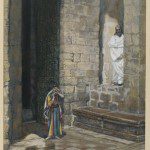As he kindly surveyed them, he smiled.
And without saying it, he seemed to exude it. “Be not afraid.”
In the village of El Rincon outside of Havana, under the sweltering Cuban sun, the aging pontiff with his pale blue eyes, stooped posture and sweetly pained face fought the grip of Parkinson’s disease in order to express himself. And he smiled. For before him were his people. Not dignitaries and opinion-makers, cardinals and bishops, philosophers and playwrights. No. He was in the presence of even greater souls: the sick and suffering.
At the Shrine of St. Lazarus, a site dedicated to the friend whose death led Christ to openly weep, assembled a broken humanity. And the Pope was one of them. What could he say to them? What could the afflicted say to the afflicted? Would he shrug in dismay and disillusionment? Would he offer empty platitudes unsatisfactory to all?
No.
Because he has learned otherwise. The crucible in which Karol Wojtyla’s life was formed attested not only to the searing marks of suffering, but to the transformative Grace that came in suffering’s wake. Enduring forced labor from Nazi overlords, tragic deaths of family members, dehumanizing harassment by Soviet masters, expectations by church hierarchy above, demands of an ever needy flock below and the wasting, freezing effects of an unrelenting neurodegenerative disorder had deeply wounded the Pope. And shaped him to keenly comprehend – to literally live in – the brokenness he now found around him.
“Pain is a mystery, often inscrutable to reason. It forms part of the mystery of the human person, which alone comes clear in Jesus Christ who reveals to man man’s true identity. Christ alone enables us to know the meaning of all that is human.
Christ responds neither directly nor abstractly to human questioning about the meaning of suffering. Human beings come to know his saving response in so far as they share in the sufferings of Christ. The response which comes from this sharing is before all else a call. It is a vocation. Christ does not explain in some abstract way the reasons for suffering, but says first of all: ‘Follow me’, ‘Come’, with your suffering share in this work of salvation of the world, which is realized through my suffering, by means of my Cross.”
There is no pat answer to suffering. None that our puny human brains could ever begin to comprehend. When Job haughtily thrust God in the dock to answer why he suffered, God very soon began his stern, but loving cross-examination of Job. Job, not God, belonged in the dock…and was found wanting. In the end, Job begged for mercy for his faithlessness and received Grace, though not complete understanding. And that was okay. Job had seen God and fell silent, humble and content. His Grace was sufficient.
Thirty-four year-old Catholic writer Flannery O’Connor, reinforced this wisdom at a young age in part due to her sufferings from lupus. She wrote of the painful burden the religious are called to bear.
“What people don’t realize is how much religion costs. They think faith is a big electric blanket, when of course it is the cross.”
Still. Suffering is difficult. It creates great fear and anxiety. Hans Urs von Balthasar once offered this observation that I have found endlessly reassuring,
“When one surveys even from a distance how often and how openly Sacred Scripture speaks of fear and anxiety, an initial conclusion presents itself: the Word of God is not afraid of fear or anxiety.”
Even so, it is the cross. It is our vocation. Just like God’s pointed message to Job, we are to listen. There is no answer on this side of eternity that will fully explain the reasons for our suffering. Now we see as in a mirror darkly, but soon we shall see face to face. But too often we forget: while suffering is a mystery, God’s love for us is not. And the keys to salvation are not perfect comprehension, but humble faithfulness.
The suffering pontiff similarly implored his hobbled audience. The Christ walked through Hell first. And emerged victorious. Now, he calls us to trust that the victory is ours too. If only we can endure a bit longer. “If you seek patience, you will find no better example than the cross,” St. Thomas Aquinas once said. In seeing the God of our Faith condescend to become man, teach us and then endure unparalleled suffering and humiliation, we see something no other faith, philosophy or ideology could claim, much less comprehend. And in this Truth is our solace. Our Grace is on the other side of His suffering, so perhaps we can accept our share. As G.K. Chesterton brilliantly observed,
“But in that terrific tale of the Passion there is a distinct emotional suggestion that the author of all things (in some unthinkable way) went not only through agony, but through doubt…In a garden Satan tempted man: and in a garden God tempted God. He passed in some superhuman manner through our human horror of pessimism. When the world shook and the sun was wiped out of heaven, it was not at the crucifixion, but at the cry from the cross: the cry which confessed that God was forsaken of God…Alone of all creeds, Christianity has added courage to the virtues of the Creator. For the only courage worth calling courage must necessarily mean that the soul passes a breaking point and does not break.”
And so in the midst of suffering, in the midst of uncertainty as to why it happens and when it will happen, we are to be encouraged that a loving God has literally shared in our suffering, that his anguish was the instrumental doorway to Grace and that we will never, ever be forsaken. To the disabled and destitute before him on that sweltering Cuban day, the future saint said,
“This is the true meaning and value of suffering, of the pain which is physical, moral and spiritual. This is the Good News which I wish to pass on to you. To our human questioning, the Lord responds with a call, with a special vocation which is grounded in love. Christ comes to us not with explanations and reasons which might either anaesthetize or alienate us. Instead, he comes to us saying: “Come with me. Follow me on the way of the Cross. The Cross is suffering”. “Whoever wants to be a follower of mine, let him deny himself, take up his cross and follow me” (Lk 9:29). Jesus Christ has taken the lead on the way of the Cross. He has suffered first. He does not drive us towards suffering but shares it with us, wanting us to have life and to have it in abundance.”
Embrace your cross and fix your eyes on Christ. All will be well. All will be well.
Or in the words of the smiling St. John Paul II, “Be not afraid.”
Yes.
Be not afraid.











